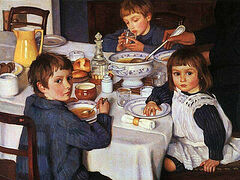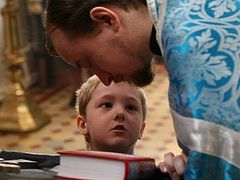In the New Testament scriptures, the theme of childhood has a special place. It is quite likely that we can speak about a New Testament theology of childhood, since such a concept has a very specific theological subject matter.
The Lord Himself, just like His apostles, speaks of childhood. However, there is a certain significant difference between the statements of Christ, those of the apostles Peter and John on the one hand, and of the apostle Paul on the other; yet there exists no contradiction here. The difference in views on childhood in the New Testament isn’t about a clash of divergent opinions, but rather different perspectives and contexts that actually complement one another.
Childhood is viewed both in the literal sense (cf. Eph. 6:4; Col. 3:21) and allegorical sense. Allegorically, childhood is used in regard to the knowledge of God and ascetic deeds (ascesis) in two definitions—carnal and spiritual.
In the carnal sense, childhood has a negative meaning, because it is used as a symbol of immaturity, unpreparedness, slow wit, ignorance, lack of education, naivety, immaturity, and materialistic creatureliness in the knowledge of God.
At the same time, this understanding of childhood is in contrast to adulthood as the age of maturity, a sense of purpose, knowledge, erudition, enlightenment, worldly wisdom, preparedness, and perfection in the knowledge of God.
And I, brethren, could not speak to you as to spiritual people but as to carnal, as to babes in Christ. I fed you with milk and not with solid food; for until now you were not able to receive it, and even now you are still not able; for you are still carnal. For where there are envy, strife, and divisions among you, are you not carnal and behaving like mere men? (1 Corinthians 3:1-3; see also 1 Corinthians 13:9–11; Ephesians 4:14–15; Hebrews 5:12–14).
Here childhood (infancy) means a juvenile age and carnal state of mind. According to the holy fathers, the mind, or the spirit, is the highest power of the soul, responsible for experiential knowledge of God that stands in opposition to the flesh. Adulthood, on the other hand, denotes the perfect spiritual state of mind that already beheld God.
Therefore, in the context of a virtuous ascent to God and possessing the knowledge of Him, carnal childishness is opposed to spiritual adulthood just as immaturity is opposed to maturity.
In the spiritual sense, childhood is an entirely positive concept conceived as the representation of a simple, pure, humble, and sinless faith, which is the chief driving force of all Christian virtues, including the loftiest of them all—the love of God and neighbor (Matt. 22:37–40). In this respect, childhood is perceived as a pure and unspoiled moral beginning and the foundation of the subsequent righteous life. Christian ascesis always begins with the rueful and humble appeal of the soul to God and faith in Him, which is specifically symbolized by childishness.
On two occasions, the Lord refers to His apostles as “children,” both of them being found in the Gospel of John. During the first occurrence, Christ calls His closest disciples “children” during the Last Supper, after Judas leaves and prior to His betrayal, condemnation and passion on the cross (see John 13:33); this happens a second time after Christ’s resurrection, during His appearance to the disciples at the Sea of Tiberias (see John 21:5).
When Christ calls His Apostles “children” it shows the heights of His trust and closeness with them
When Christ calls His Apostles “children” it shows the heights of His trust and closeness with them. The Savior speaks to His disciples as their father to his beloved children, bids farewell to them and leaves instructions for the future.
Prior to that, the Lord spoke to His disciples about children:
But when Jesus saw it, he was much displeased, and said unto them, Suffer the little children to come unto me, and forbid them not: for of such is the kingdom of God. Verily I say unto you, whosoever shall not receive the kingdom of God as a little child, he shall not enter therein (Mk. 10:14-15); Verily I say unto you, Except ye be converted, and become as little children, ye shall not enter into the kingdom of heaven. Whosoever therefore shall humble himself as this little child, the same is greatest in the kingdom of heaven. (Matt. 18: 3-4); I thank thee, O Father, Lord of heaven and earth, because thou hast hid these things from the wise and prudent, and hast revealed them unto babes. Even so, Father: for so it seemed good in thy sight. (Matt. 11: 25-26); Whoever receives one little child like this in My name receives Me. Whoever causes one of these little ones who believe in Me to sin, it would be better for him if a millstone were hung around his neck, and he were drowned in the depth of the sea (Matt. 18: 5–6).
Saying so, Christ first of all rejects any disregard of children and childhood as something insignificant and unimportant; secondly, He holds children up as role models, calling to learn from them to humbly accept the Kingdom of God; thirdly, He places children above the wise men of this world as mystic bearers of Divine revelation; fourthly, He proclaims a loving attitude toward children (and their acceptance) as the condition for salvation.
We must carefully look up to children as models of moral perfection—their absolute faith, sincere trust, humility, amiability, unconditional love, absolute gratitude, reverent fear, openness to learning and creating; their hope for the best, willingness to change and to be reformed. Through his love for children a Christian expresses his love for Christ. He who does not love children does not love the Lord.
Complete openness to God is the ability of a child’s heart and its most important talent
Complete openness to God is the ability of a child’s heart and its most important talent. According to the holy fathers, the heart is not simply a bodily organ responsible for the circulation of blood in the body, but the center of the entire spiritual and carnal life of man. How a man lives and breathes and what he is like in reality hinges on the works of his heart, its inner life, aspirations and motivations—for where your treasure is, there your heart will be also (Luke 12:34). It is in the heart that the crucial choice is made between the will of God and the temptations of the devil; this is where that front line between God and the devil is formed. “God and devil are fighting, and the battlefield is the heart of man” (Feodor Dostoyevsky).
While childhood is considered complete trust in God, then adulthood, as its opposite, is perceived as an image of wickedness, insincerity, impurity, self-love, pride, distancing from God, and distrust in Him.
Children, especially infants and young children, with the purity of their hearts and souls, are capable of hearing God’s call, and they respond immediately. Therefore, they can see and feel the presence of God in their hearts and lives. The commandment, Blessed are the pure in heart: for they shall see God (Matt. 5:8), speaks precisely about this.
This isn’t so with adults. Many of them, who are already defiled by sinful passions, having dark and filthy hearts, are often incapable of hearing the voice of God. If it does break through to their consciousness, they are unable to respond to it.
An adult who is already weighed down by his sins finds it extremely difficult to give up his prideful will, to extricate himself from the bonds of sinful passions, and to follow the will of God. It is so much easier for him to sin by surrendering to the temptation of the evil one than to refrain from committing a sin, let alone perform virtuous deeds.
The apostle Paul said beautifully about this pitiful, fractured state of man:
For the good that I would I do not: but the evil which I would not, that I do. Now if I do that I would not, it is no more I that do it, but sin that dwelleth in me. I find then a law, that, when I would do good, evil is present with me. For I delight in the law of God after the inward man: But I see another law in my members, warring against the law of my mind, and bringing me into captivity to the law of sin which is in my members. O wretched man that I am! who shall deliver me from the body of this death? (Rom. 7:19-24).
In terms of morality and ascesis, the concept of childhood the Lord uses is relevant to the Apostle Paul’s concept of the inner man. Ascetic spiritual childlikeness as intuitive, cheerful confidence in the Lord is opposed to carnal adulthood, which denotes a state of deep sinful dependence.
In his first letter, the Apostle Peter urges believers:
Wherefore laying aside all malice, and all guile, and hypocrisies, and envies, and all evil speakings, as newborn babes, desire the sincere milk of the word, that ye may grow thereby: If so be ye have tasted that the Lord is gracious (1 Pet. 2:1-3).
The beloved disciple of Christ, St. John the Theologian, addresses Christians with the words “children,” “my children,” “beloved,” calling them “born of God,” “children of God,” in contrast to “children of the devil.”
Whosoever is born of God doth not commit sin; for his seed remaineth in him: and he cannot sin, because he is born of God. In this the children of God are manifest, and the children of the devil: whosoever doeth not righteousness is not of God, neither he that loveth not his brother (1 Jn. 3:9-10).
He also сompares spiritual childhood with other spiritual stages of Christian life—adolescence, youth, and fatherhood:
I write unto you, little children, because your sins are forgiven you for his name’s sake. I write unto you, fathers, because ye have known him that is from the beginning. I write unto you, young men, because ye have overcome the wicked one. I write unto you, little children, because ye have known the Father. I have written unto you, fathers, because ye have known him that is from the beginning. I have written unto you, young men, because ye are strong, and the word of God abideth in you, and ye have overcome the wicked one (1 Jn. 2:12-14).
As we see, the Apostle John the Theologian develops a positive spiritual understanding of childhood rooted in the teachings of the Lord Himself. Following the example of his Master, he refers to believers as “children.” For him, all believers are in essence the children of the heavenly Father, born of God and abiding in His love. People become children of God the Father in the Church of Christ, their spiritual birth being realized in the sacrament of Holy Baptism. In a narrower sense, childhood refers to the first stage of ascent to God, the beginning of spiritual knowledge of Him.
To summarize, we should say that the New Testament calls us to be both children and adults—children at heart, who wholeheartedly believe in God and trust Him, and adults in mind, who responsibly comprehend God and His teachings.
Childhood is the root and beginning of adulthood. Sincere childlike faith is the root and beginning of an adult knowledge of God
Childhood is the root and beginning of adulthood. Sincere childlike faith is the root and beginning of adult knowledge of God. Through the lips of the Lord and His apostles, the Church calls us, on the one hand, to always remain children in our hearts, keeping and never losing that heartfelt childlike nature. On the other hand, we must realize that in our minds, we are still immature children and we should try our hardest to become adults in matters of the acquisition of the knowledge of God.
Brethren, be not children in understanding: howbeit in malice be ye children, but in understanding be men (1 Cor. 14:20).




